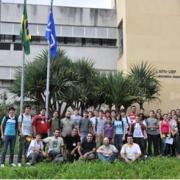SFT group participation in EPLANET project
SFT group is participating in the Scientific Computing Work Package (WP8) of the EPLANET project (http://www.roma1.infn.it/exp/eplanet/). The main objective of EPLANET is to create and reinforce networks for joint research projects and for high-level training of personnel both in European and other Latin-American Institutes/universities. Another aim is to improve internal Latin-American collaboration by following examples of successful collaboration that we enjoy in Europe.
In the last PH newsletter we wrote an article on the Concurrency Project, that provides a forum for the HEP community to exchange information related to the on-going R&D programme in concurrent programming. This project was triggered by the increasing importance of software parallelism, which is driven by new trends in CPU architecture (many-core, vectorisation etc.). The subject is of such topical interest that it has led to SFT developing a series of tutorials and exercises as basic training in concurrent programming and which we are able to offer to our latin-american partners in EPLANET. In 2012 SFT organised two visits by SFT staff members. One was by Benedikt Hegner who visited the University of Sao Paolo in Brazil, the other by Danilo Piparo who went to the Universidad Tecnica Federico Santa Maria (UTFSM) in Valparaiso, Chile. Both training events were well received and have led to new opportunities for collaborating in this new field.
 The first visit was hosted by the ALICE Brazilian group in the University of Sao Paolo. The Brazilian group is engaged in ALICE physics analysis, while it also operates a Tier-2 centre of the Worldwide LHC Grid (WLCG). The group is keen to contribute to the future re-engineering of the ALICE code in a way that will exploit parallelism.
The first visit was hosted by the ALICE Brazilian group in the University of Sao Paolo. The Brazilian group is engaged in ALICE physics analysis, while it also operates a Tier-2 centre of the Worldwide LHC Grid (WLCG). The group is keen to contribute to the future re-engineering of the ALICE code in a way that will exploit parallelism.
Benedikt who is an expert on LHC experiments’ reconstruction and analysis software, visited the group in Sao Paolo in order to deliver a series of lectures specially designed to provide the tools required for efficient parallel software development. During his visit Benedikt assisted the group with complex parallelization problems, while also trying to improve the general quality of reconstruction and triggering code and keep the software quality at a high level.
Through a series of lectures the participants were introduced to the “many-core era” of processor design, became familiar with the basic tools of parallel programming while various approaches to this type of programming were discussed. The lectures were followed by 14 hours of hands-on exercises based on real-life examples of HEP applications. The lecture series was well received and the number of participants increased over time. The visit was a success and subsequently two PhD students were engaged in new concurrency activities in ALICE. The work of one of the students is the result of the effective collaboration between the Brazilian ALICE group and the group of Prof. Takeo in the engineering department. “The cooperation of a physicist and an engineer will be a very interesting synergy” says Marcelo Munhoz, Professor in the University of São Paulo.
“The intended transfer of knowledge between the CERN group and the host group was very successful” says Benedikt. "This was only possible thanks to the firm support and the remarkable efforts of the host group".
The second visit was jointly hosted by the faculty of physics, part of the ATLAS collaboration, and the faculty of computer science of the Universidad Technica Federico Santa Maria (UTFSM) in Valparaiso. Professor William Brooks leads the physics group and is responsible for the local Tier-2 centre, and Professor Luis Salinas is the head of the faculty of computer sciences.
Danilo is a specialist in HEP reconstruction code, high performance scientific computing and parallel software development and he spent two weeks in Valparaiso in order to give the training.
The rich scientific programme offered to the university included a series of ten lectures and eight hands-on sessions covering basic software engineering tasks, extending from the characterization of tools for software debugging and profiling, to techniques for the enhancement of the productivity and parallel programming.
Many PhD and postdoc students attended the course as well as more experienced researchers coming from the field of HEP, mathematics, telecommunications and computer science. “The visit was a success, in terms of participation to the event and experience accumulated within the SFT group, thanks to the preparation of such an ambitious academic programme” said Danilo. In addition to the official programme, Danilo had the opportunity to collaborate with master and Phd students during his stay, helping them tackle problems concerning performance and parallelism of the software infrastructure linked to their research projects.
The material used in the two workshops is now publicly available via the web (https://twiki.cern.ch/twiki/bin/view/Main/EplanetUtfsm2012). The aims of these visits were achieved thanks to the close collaboration between SFT members and the local organizers. These lectures triggered interesting discussions among the participants and motivated further collaboration between different groups. Transferring knowledge to the local group is an important objective for the members of the SFT group, as they should get involved in the effort of re-engineering large parts of the code used for data analysis and processing by the LHC experiments.
Further readings:
UTFSM Valparaiso university newspaper
University of Sao Paolo: here
ALICE MATTERS article
